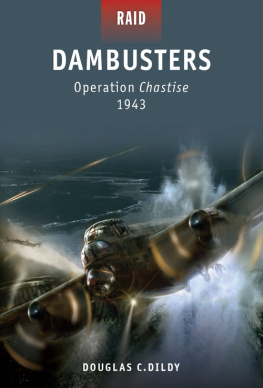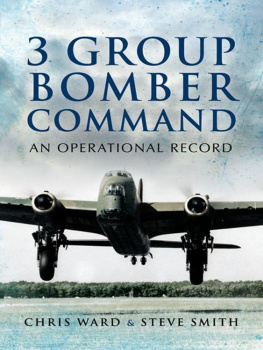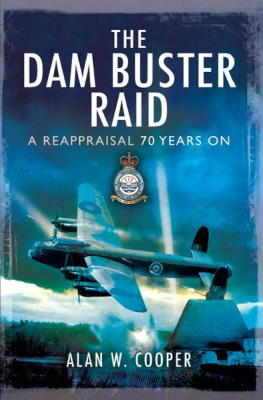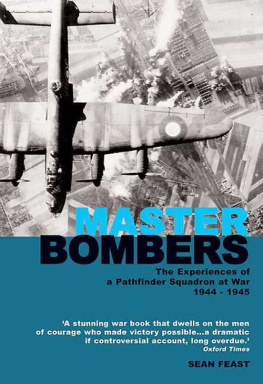AIR
BATTLE
OF THE
RUHR
AIR
BATTLE
OF THE
RUHR
THE RAF OFFENSIVE
MARCH - JULY 1943
ALAN W. COOPER
First published in Great Britain in 1992 by Airlife Publishing Ltd
Published in hardback format in 2001 by
Wrens Park Publishing, an imprint of J.Williams & Sons Ltd.
Reprinted in this format in 2013 by
P EN & S WORD A VIATION
An imprint of
Pen & Sword Books Ltd
47 Church Street, Barnsley
South Yorkshire
S70 2AS
Copyright Alan W. Cooper, 1992, 2001, 2013
ISBN 978 1 78159 062 1
The right of Alan W. Cooper to be identified as Author of this work
has been asserted by him in accordance with the Copyright,
Designs and Patents Act 1988.
A CIP catalogue record for this book is available from the British Library
All rights reserved. No part of this book may be reproduced or transmitted in
any form or by any means, electronic or mechanical including photocopying,
recording or by any information storage and retrieval system,
without permission from the Publisher in writing.
Printed and bound in England
By CPI Group (UK) Ltd, Croydon, CR0 4YY
Pen & Sword Books Ltd incorporates the Imprints of Pen & Sword Aviation,
Pen & Sword Family History, Pen & Sword Maritime, Pen & Sword Military,
Pen & Sword Discovery, Pen & Sword Politics, Pen & Sword Atlas,
Pen & Sword Archaeology, Wharncliffe Local History, Wharncliffe True Crime,
Wharncliffe Transport, Pen & Sword Select, Pen & Sword Military Classics,
Leo Cooper, The Praetorian Press, Claymore Press, Remember When,
Seaforth Publishing and Frontline Publishing
For a complete list of Pen & Sword titles please contact
PEN & SWORD BOOKS LIMITED
47 Church Street, Barnsley, South Yorkshire, S70 2AS, England
E-mail: enquiries@pen-and-sword.co.uk
Website:
Contents
THE BOMBER AIRMANS LAMENT
Phantom bombers on the old airfields
where do you fly tonight?
Are you off to visit Berlin, Hamburg, Nuremberg or Mannheim
or somewhere in the Ruhr, east of the Rhine?
Phantom bombers on the old airfields
where do you fly tonight?
Through a moonless or full moonlight sky
giving battle as you fly.
Returning shrouded, but with your spirits aces high.
Ghostly engines, silenced by time
outlined at dispersal by rings of rime.
With ghostly guns of noiseless rattle
patiently waiting the phantom hours of battle.
Phantom bombers on the old airfields
Where do you fly tonight?
If you will only wait for me to join you
in the air battles of long ago
it will be in the company of my old aircrew.
Louis Patrick Wooldridge DFC
ex 51 and 578 Halifax Squadrons
To all aircrew who flew in 1943 the one target then, and even still today, that made their stomach muscles tighten, was the Ruhr; happy valley or the land of no return, as the aircrew knew it. To someone who did not fly in that period its best described as the air battle of the Somme or Passchendaele, in which the bombers and their crews went out time and time again similar to the tommy who, in World War I went over the top time after time.
There were targets within Bomber Command that on occasions were recorded as being quiet trips, but this was not so with the Ruhr. As soon as the coast was crossed, it was a case of running the gauntlet to the target and back, through enemy searchlights, heavy and light flak and fighter aircraft, all intent on one thing to knock you out of the sky. The mental strain of continually having to key themselves up to face this, contrasting with rest days or aborted operations when they would unwind, relax and try and forget the war, was considerable. The effect was rather like a coiled spring continually being wound, run down and then wound up again. There were also times when, having actually got to the perimeter of the airfield and ready to take off, a signal to abort the operation would be received. This often induced a feeling of anticlimax among the aircrew. Until you had got those magic thirty operations or trips recorded in your flying log-book (that little official blue RAF book, which recorded operations in red ink, and non-operations such as training flights, air tests, etc. in blue ink) there would be no respite and no choice but to get on with it and get the trips under your belt. Many of these little blue books have very few pages used, and the last operation recorded in it would have been entered by someone else, probably the adjutant, on behalf of the missing airman. These entries and the ones in the operation record book showing the battle orders, are all that is recorded to say for many: I was there. For those who survived it was a case of carrying on and entering operations in their log-book, including hours flown, the target just the bare facts. Each month it would be inspected by the flight commander and then, suddenly, you would be told one day, the operation that night was your last or the last for your first tour of operations.
Perhaps the full extent of the contribution by Bomber Command in its offensive against the Ruhr and the German industries will never be evaluated, as much of its efforts were in the dead of night, unseen by most; not like an army which goes into battle viewed and recorded by many observers. But the efforts of the crews who went, whether successful or not, can never be doubted. They were young men with an average age of 21, undertaking tasks and facing dangers that in a peacetime Air Force would be faced by much older men. For an example, had Guy Gibson been in 617 Squadron today, he would be, at the age of 25 (which was his age when he led the famous Dambusters Raid) one of the youngest members of the squadron. The commanding officers themselves, in many cases, were only in their twenties, and not only having to face the same amount of danger but also to lead from the front, and to do so without showing any fear.
For the men who completed their tour of operations, the look of ageing rapidly set in on their faces, changing from a boyish look at the beginning of their tour with, perhaps, a sense of adventure, to later, a look of dazed disbelief similar to shell-shock or being punch drunk. Commanders had to cope with the strain of sending men out time after time and hoping their judgement and planning were right. These commanding officers and flight commanders not only had the responsibility of leading and showing the way in the air but also had to face the same dangers as the rest of the aircrew. Many of these commanders were lost during the Battle of the Ruhr period; men whose experience would be missed. A number of them paid the price of flying far more than they were required to do, being always the first on the Battle Order for difficult operations.
The casualty rate was high. In the period of the Ruhr Battle, over 1000 aircraft and 5000 aircrew went missing, many to become names on memorials or to be buried in far-off lands. Others would spend the rest of the war languishing in a prisoner of war (POW) camp, although some would evade capture or escape and live to fight again. For those who did not return, their last sight of the UK would have been the groundcrew waving them off with Godspeed and good luck. Was it worth it? All those men at the peak of their youth, many too young to vote but old enough to die for their country.
Nearly fifty years later, looking at it on a broad scale and with all the facts available, its difficult to see how it could have been prevented. All the men who were killed, I am sure, would have said, yes, it had to be done, and would have done it again if called upon. All of these men at the time were volunteers. One could be conscripted to join the services or the RAF, but not compelled to fly on operations. The comradeship of these men, flying as crews, and with each depending on the other was memorable. Without doubt now, although costly, the Battle of the Ruhr was a success and played a significant part in the ending of the war in Europe.

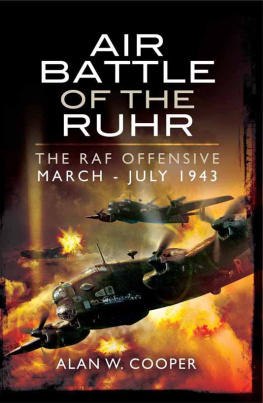


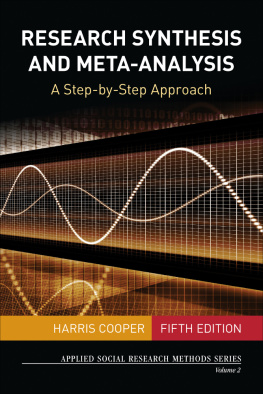
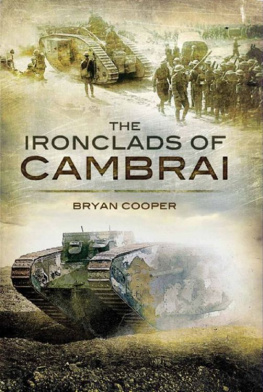


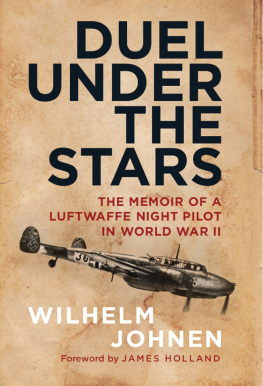


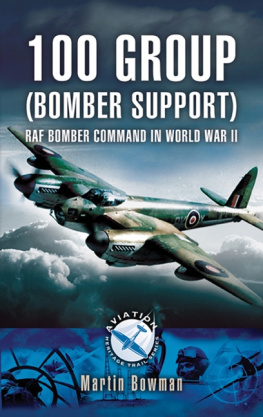
![Bar Wing Commander Guy P. Gibson VC DSO - Enemy Coast Ahead [Illustrated Edition]](/uploads/posts/book/180257/thumbs/bar-wing-commander-guy-p-gibson-vc-dso-enemy.jpg)
